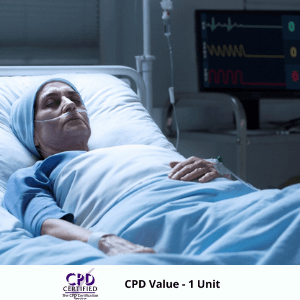End of Life Care
If we were to look for a definition of end of life care, it is care that “helps all those with advanced progressive, incurable illness to live as well as possible until they die.” That definition comes from the National Council for palliative care. Palliative care is care for the terminally ill and their families, especially care provided by an organised health service.
Advanced Care Planning
When the doctors have done all they can, the patient and their relatives can decide whether they want to die at home or in hospital. This is called advanced care planning. This end of life care training will take you through effective processes when a terminally ill person decides they wish to die in their own home. These processes are necessary to ensure full communication between the patient and their family with the GP, the ambulance service, community nurses, social care, hospice services, and anyone else involved. This communication must be both secure and easily accessible.
The patient is put in touch with the care team and given a phone number to call anytime day or night. This would be one central coordinating number, the palliative care support line, so they can phone in and the coordinator there will know which service they need.
The end of life care course discusses organisations that offer experienced and trained bereavement support workers who are used to helping people who are dealing with death. They will not be shocked or judgmental whatever they hear. People can speak freely about their emotions.
Patterns of Dying and the Dying Process
The nature of multiple and often chronic health problems, such as many older people experience over a period of time, makes it difficult to define when someone can actually be said to be dying. This end of life care training examines patterns of dying under the headings:
- There is sudden death. When a person dies without warning, following an event such as a heart attack, or fall or a stroke.
- There is terminal illness, where the death is usually anticipated. There is what is known as an acute episode, such as a chest infection or stroke, or it becomes apparent that the person will not recover and will die shortly.
- There is also general deterioration. This describes the condition of many older people who live with multiple illness conditions and gradually become frailer and less able to manage – with a need for greater support and care. This kind of dying can occur over a long period of time.
It is not always easy to know when a person is dying, particularly if they are frail and their condition is deteriorating slowly. A lot of research is being carried out on how to identify when someone is dying. Depending upon the medical condition an older person has, there may be recognisable stages of severity that will tell you they are moving into a dying phase. The course looks at these signs and three distinct stages to the dying process that which indicates that death is imminent.
Support and Aftercare
The course discusses the pain associated with the dying process and ways in which it can be managed effectively. Many medicines and alternative methods such as massage are available to treat the pain associated with dying.
You are invited, in this part of the course, to explore ways in which to support the dying person and their family through
- Psychological care
- Emotional care
- Spiritual care
- Social Care
This training course provides a template, or starting place, to prepare the patient and their loved ones for their imminent death, You can also access the NHS guide on “What End of Life Care Involves” which gives advice on how to access palliative care.
| Course Content | Module |
| End of life care | 1 |
| Feelings and emotions | 2 |
| Patterns of dying | 3 |
| The dying process | 4 |
| Support and aftercare | 5 |
Course Assessment
Online assessment in this training course is carried out by a series of multiple choice questions. Candidates must answer 70% of the questions correctly to pass each module. We advise you to complete each module and answer the question before moving on to the next module. This provides a better learning experience because you will need to have knowledge from earlier modules to understand some of the material in the later modules. For those who complete the course successfully, a PDF certificate of the award is sent directly to your inbox. Hard copies of the award are available on request. The course takes 25 minutes of training to complete. This is course content only and does not cover the time it takes to answer questions.



